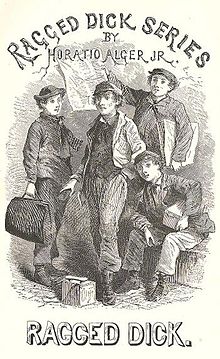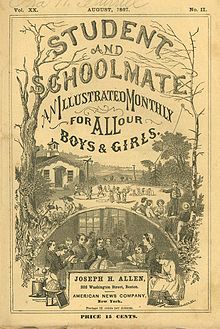Ragged Dick
Ragged Dick; or, Street Life in New York with the Boot Blacks is a Bildungsroman by Horatio Alger Jr., which was serialized in The Student and Schoolmate in 1867 and expanded for publication as a full-length novel in May 1868 by the publisher A. K. Loring.
The Alger canon is described by Carl Bode of the University of Maryland as "bouncy little books for boys" that promote "the merits of honesty, hard work, and cheerfulness in adversity."
Generally, a "malicious young snob" and a "middle-aged rascal" schemed to hurt the hero's rise, and a "mysterious stranger" and a "worldly but warmhearted patron" were at hand to ensure his success.
New York City's bootblacks at the time Alger wrote Ragged Dick were boys, usually between the ages of ten and sixteen, "with any number of bad habits, and little or no principle".
[4] Alger told the Ladies Home Journal in 1890, "I had conversations with many street boys while writing 'Ragged Dick' ... and derived from many of them sketches of character and incidents".
Alger adapted the conventions of the moral, sentimental, and adventure literature of the period to fashion the formula he would employ in writing Ragged Dick and the dozens of boys' books that followed it.
"Alger did not invent his formula out of whole cloth," Alan Trachtenberg wrote, "but boiled down the conventions to make a more refined brew: a style accessible both to young and adult readers; clever dialogue and vivid descriptions; a cast of characters who presented a range of moral positions; a physical setting itself a part of the action.
"[6] Ragged Dick has been described as a "puerile fantasy of the assimilation of the so-called dangerous classes to the bourgeois social order",[7] but Sacvan Bercovitch believes Alger created "a relatively realistic hero" in Dick—one who smokes, swears, plays pranks, and spends what money he has with abandon, yet one who displays an emotional depth foreign to Alger's subsequent heroes, who increasingly exhibited "the slow accretion of civilized instincts and habits, including proper speech, cleanliness, and courtesy" and who lacked Dick's "sense of humor, sadness, and critical intelligence".
"[9] He believes it impossible to know whether Alger lived the life of a secret homosexual, "[b]ut there are hints that the male companionship he describes as a refuge from the streets—the cozy domestic arrangements between Dick and Fosdick, for example—may also be an erotic relationship."
"[12] Scharnhorst observes that the Providence Evening Press, the Boston Transcript, The Christian Register, and the Monthly Religious Magazine praised the story, describing it as "simply charming", "excellent", and "spirited and inspiring".
"[13] Putnam's Magazine, in its issue of July 7, 1868, wrote that "Ragged Dick is a well-told story of street-life in New York, that will, we should judge, be well received by the boy-readers, for whom it is intended.
We find in this, as in many books for boys, a certain monotony in the inculcation of the principle that honesty is the best policy, a proposition that, as far as mere temporal success is concerned, we believe to be only partially true.
"[15] Scharnhorst indicates Alger's legacy resides not only in the several parodies and satires by William Dean Howells, Stephen Crane, F. Scott Fitzgerald, Nathanael West, John Seelye, Glendon Swarthout, and William Gaddis, but also in the Horatio Alger Awards and in the many young readers who embraced his moral and humanitarian philosophy and were disinclined to embrace robber baron capitalism.
Scharnhorst writes "It would seem that Alger was either over-rated as an economic and political propangandist or – more probably – his books were simply not designed thematically to spread the gospel of orthodox capitalism and convert the readership of The Masses.
The show's librettist, Richard Seff, writes that the musical is an original based on Ragged Dick and Silas Snobden's Office Boy: "We've borrowed characters from both novels, youthened some, aged others, re-invented a few, created a few of our own.
In his plot summary, Paul wrote that Ragged Dick is working his way slowly up the ladder of respectability when an opportunity to improve his prospects is offered him in Snobden's haberdashery.



